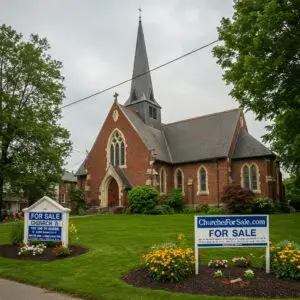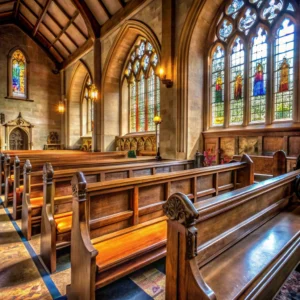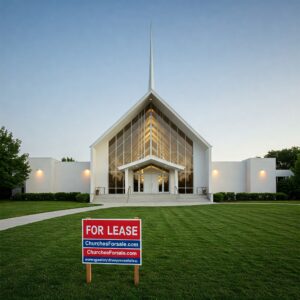
How to List Your Church Property for Sale
Selling a church property is a significant decision that often comes with a mix of emotions, practical concerns, and legal requirements. Whether your congregation is relocating, merging, or simply needs to downsize, the process of listing churches for sale can feel overwhelming at first. However, with the right guidance and a clear plan, you can navigate this journey smoothly and ensure the best outcome for your church community.
Churches are unique properties, both in their design and in the role they play within their communities. This uniqueness means that selling a church is not quite like selling a typical home or commercial building. There are special considerations, from zoning and legal approvals to honoring the legacy of the congregation and ensuring a respectful transition.
At ChurchesForsale.com, our mission is to make church real estate simple. This article will walk you through the essential steps to list your church property for sale, helping you understand the process, avoid common pitfalls, and maximize your property’s value. Whether you’re just starting to consider selling or are ready to take the next step, this guide is designed to support you every step of the way.
1. Assessing Your Church Property
Before listing your church for sale, it’s crucial to thoroughly assess the property. Start by evaluating the physical condition of the building and grounds. Take note of any repairs or upgrades that may be needed, as these can impact both the value and marketability of your property. A professional property report or inspection can help identify issues and provide a clear picture of your church’s current state.
Next, consider the property’s layout and features. Does it include a sanctuary, fellowship hall, classrooms, or office spaces? Understanding the full scope of what your property offers will help you highlight its strengths to potential buyers. Be sure to gather all relevant documentation, such as floor plans, maintenance records, and recent improvements.
Finally, review the location and surrounding area. Proximity to major roads, public transportation, and community amenities can all influence buyer interest. A well-located church property is often more attractive to a wider range of buyers, including other congregations, nonprofits, or even developers looking for unique spaces.
2. Understanding Legal and Governance Requirements
Churches for sale are subject to specific legal and governance requirements that differ from standard real estate transactions. Begin by reviewing your church’s governing documents, such as bylaws and articles of incorporation, to determine who has the authority to approve a sale and what steps must be followed. This may include calling a congregational meeting and obtaining a majority vote from active members.
It’s also important to understand any denominational or organizational rules that may apply. Some churches require approval from a regional or national body before proceeding with a sale. Failing to follow these procedures can delay or even invalidate the transaction.
Additionally, many states require religious organizations to notify the Attorney General or another government authority before selling property. This process may involve submitting resolutions, financial statements, and independent appraisals to demonstrate that the sale is in the best interest of the church. Consulting with an attorney experienced in church real estate can help ensure compliance with all legal requirements.
3. Determining Property Value
Accurately valuing your church property is a key step in the listing process. Unlike residential homes, churches for sale are specialized properties, and their value depends on factors such as location, building condition, size, and potential uses. Start by obtaining a professional appraisal from someone experienced with religious or institutional properties.
A zoning analysis is also essential. This will clarify what types of activities or developments are permitted on the site, which can significantly affect value. For example, a property zoned for community use may appeal to other congregations or nonprofits, while a site with flexible zoning could attract developers.
Comparing your property to similar churches for sale in your area can provide additional context. Look at recent sales and current listings to gauge market trends and set a competitive asking price. Remember, pricing your property appropriately from the start can help attract serious buyers and lead to a smoother sale.
4. Preparing Documentation and Disclosures
Gathering and organizing all necessary documentation is vital when listing churches for sale. Start with the property deed, title report, and any surveys or site plans. Ensure that the title is clear of encumbrances, such as old mortgages or deed restrictions, which could complicate the sale.
Prepare a comprehensive property information packet for potential buyers. This should include details about the building’s size, layout, age, and condition, as well as information about utilities, zoning, and any recent repairs or upgrades. Full transparency helps build trust and can prevent issues during negotiations.
Don’t forget to disclose any known issues with the property, such as structural problems, code violations, or environmental concerns. In most cases, churches for sale are offered “as is,” but clear disclosures protect both the seller and buyer and help ensure a fair transaction.
5. Forming a Sale Team
Selling a church property is a team effort. Start by forming an internal committee of church leaders and members to oversee the process and keep the congregation informed. This committee can help with decision-making, communication, and ensuring that the sale aligns with the church’s mission and values.
Next, hire experienced professionals to guide you through the complexities of church real estate. A real estate broker with expertise in churches for sale can help market the property, screen buyers, and negotiate terms. An attorney familiar with religious property transactions is also essential to navigate legal requirements and draft contracts.
Consider involving other experts as needed, such as appraisers, accountants, or property inspectors. By assembling a knowledgeable team, you can avoid common pitfalls and ensure that your church’s interests are protected throughout the sale.
6. Marketing Your Church Property
Effective marketing is key to attracting the right buyers for churches for sale. Start by creating a compelling listing that highlights your property’s unique features, such as its sanctuary, fellowship spaces, and community amenities. High-quality photos and virtual tours can help showcase the property to a wider audience.
List your property on specialized platforms like ChurchesForsale.com, where buyers are specifically searching for church properties. Consider reaching out to local congregations, nonprofits, and community organizations that may be interested in purchasing a church building.
Don’t overlook traditional marketing methods, such as signage, print ads, and word-of-mouth within your faith community. The more exposure your property receives, the greater the chances of finding a buyer who appreciates its value and potential.
7. Negotiating Offers and Closing the Sale
Once you begin receiving offers, carefully review each one with your sale team and professional advisors. Consider not only the purchase price but also the buyer’s intended use, contingencies, and timeline for closing. Some congregations may prioritize selling to another faith community or nonprofit, while others may focus on maximizing proceeds.
Negotiate terms that protect your church’s interests, such as allowing time for the congregation to transition out of the building or including provisions for the removal of religious items. Your attorney and broker can help draft and review contracts to ensure all legal and financial aspects are addressed.
After accepting an offer, work closely with the buyer to complete due diligence, resolve any outstanding issues, and finalize the transaction. Be prepared for a closing process that may take several weeks or months, depending on legal requirements and buyer financing.
8. Transitioning and Moving Forward
As the sale nears completion, focus on planning a smooth transition for your congregation. Communicate regularly with members about the timeline, next steps, and opportunities to celebrate the church’s legacy. Consider holding a special service or event to honor the building and its role in your community.
Coordinate the removal of religious artifacts, furnishings, and records, ensuring that all items are handled respectfully and in accordance with denominational guidelines. Work with the buyer to facilitate a seamless handover of the property.
Finally, reflect on the future. The sale of a church property can be an opportunity for renewal and growth, whether your congregation is moving to a new location, merging with another church, or investing in new ministries. Embrace the possibilities and look forward to the next chapter in your church’s journey.
Conclusion
Listing churches for sale is a unique process that requires careful planning, teamwork, and attention to detail. By understanding your property’s value, following legal and governance requirements, and assembling the right team, you can navigate the complexities of the sale with confidence. Each step, from preparing documentation to marketing and negotiating offers, plays a vital role in achieving a successful outcome.
Remember, selling a church is more than just a real estate transaction—it’s a significant moment in your congregation’s history. Honoring the legacy of your church while embracing new opportunities can help ensure a positive transition for everyone involved. Take the time to communicate openly with your members, celebrate your shared memories, and look forward to the future with hope.
At ChurchesForsale.com, we’re committed to making church real estate simple. Whether you’re just beginning to explore your options or are ready to list your property, our team is here to support you every step of the way. With the right approach and resources, you can turn the sale of your church property into a meaningful and successful experience for your entire community.






